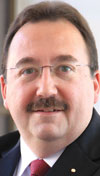
SAIS recently held a conference in Johannesburg to speak about the crime situation in South Africa and Singapore.
The South African Institute of Security and the Security Association (Singapore) recently held a joint seminar at J P Morgan which not only highlighted some of the perceptions and misconceptions of crime in South Africa today, but also examined some of the similarities and differences South Africa and Singapore face with regards to the role of the private security industry.
Taking the South African crime situation one province at a time Dr Johan Burger, senior researcher at the Institute for Security Studies (ISS) and lecturer at the Tshwane University of Technology, highlighted some of the most common trends associated with crime. “For those seeking the most up-to-date and accurate crime statistics, the ISS has launched an innovative new Crime and Justice Hub; an online resource that offers information and analysis sharing for a safer society, including trends, hot topics and safety and prevention tips. It is a one-stop crime and police information facility on the ISS website.”
When faced with a hijacking situation, your number one priority is getting away alive – this was the message from Francois Marais, vice president at J.P.Morgan Chase Bank in Johannesburg. “While 96% of the time, hijackers are armed, only 1% of hijacking incidents in South Africa lead to a fatal shooting,” said Marais. “However it is important to remember that when faced with hijackers, you are often dealing with criminals that are in a heightened state of anxiety, compounded by the effects of drugs and alcohol.”
According to Morrine Henson, director of Alwatch Security Management, Singapore is an island city-state dependent on global trade and communications, and foreign direct investment flows, but a range of geographical, social and political factors make it vulnerable to terrorism.
“In Singapore the private sector has been recruited through a variety of state initiated schemes to partner with security forces to increase and training and the number of security personnel in the private sector, the clustering of buildings and manpower resources into Security Watch Groups, conducting security assessment audits for public, commercial and residential buildings, as well as annual terrorism simulated exercises geared towards buildings operational and psychological readiness.”
Although the private security industry in South Africa is one of the fast growing industries, it is fraught with various challenges such as: lack of compliance by security service providers; lack of monitoring by the Regulatory Authority; and the tarnished reputation of the entire security industry as a result according to John Kole, lecturer in the department of criminology and security science at Unisa.
His research highlights the perceptions within the industry that there are still far too many fly by night security operators, and that PSIRA is still not serving the interests of an industry which is still largely dominated only by the major players.
Daniel Chow, director of Evtec Management Services as well as a director of Knowledge Tree Training Centre in Singapore, spoke about the significance of convergence between security technology and manpower. “This is increasingly important in a country like Singapore where there is an increasing demand for the services of private security services, but the country’s small population means that there is a lack of manpower. At the same time, the demand for more private security services both physical and technological places increasing importance on training.”
What attitude do South Africans have towards crime prevention in South Africa? This question was raised by Errol Peace, chairman of the SA Institute of Security and managing director of BTC Training (Africa). “How many law-abiding South Africans engage in police bribery or even the practice of purchasing illegal cigarettes and do they realise the far reaching implications of these seemingly small illegal acts?”

On his recent visit to Australia Peace noted the passive compliance that the public have when it comes to crime and law enforcement in that country. In addition to visible policing and technology playing a major role in crime prevention there is also a great deal of cooperation by the public, working together with law enforcement to keep crime at bay.
Something South Africa can learn from.
© Technews Publishing (Pty) Ltd. | All Rights Reserved.